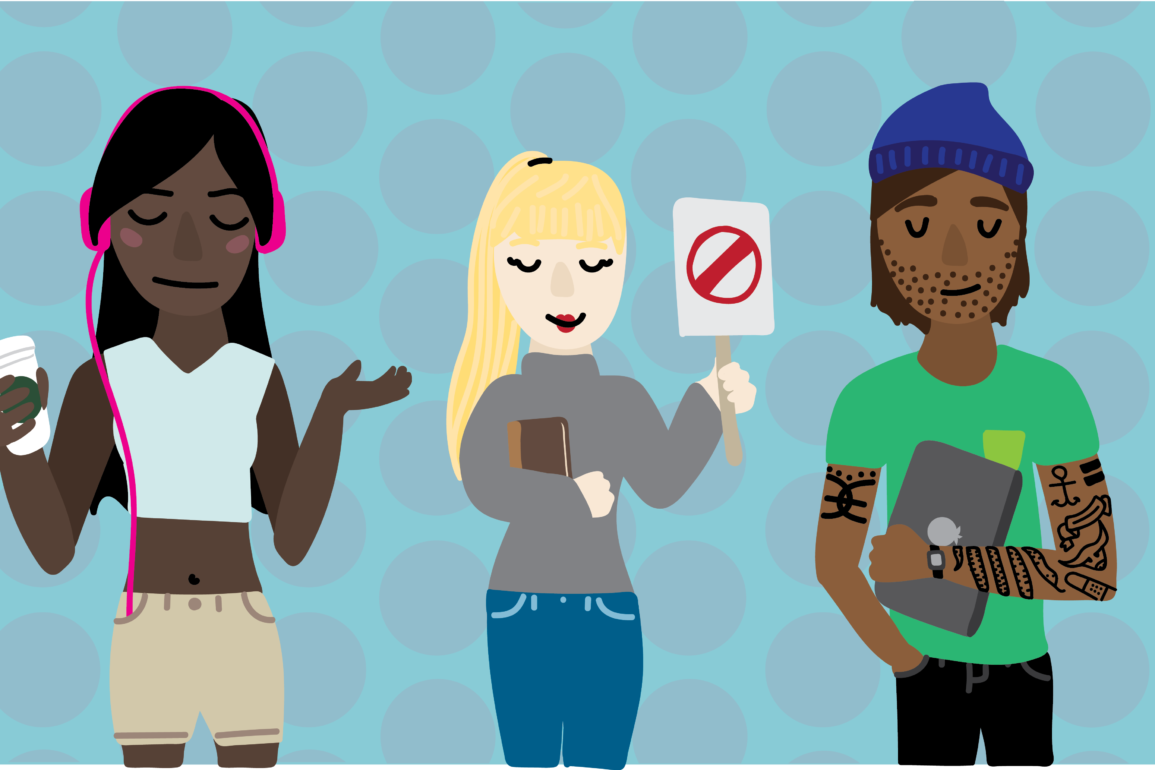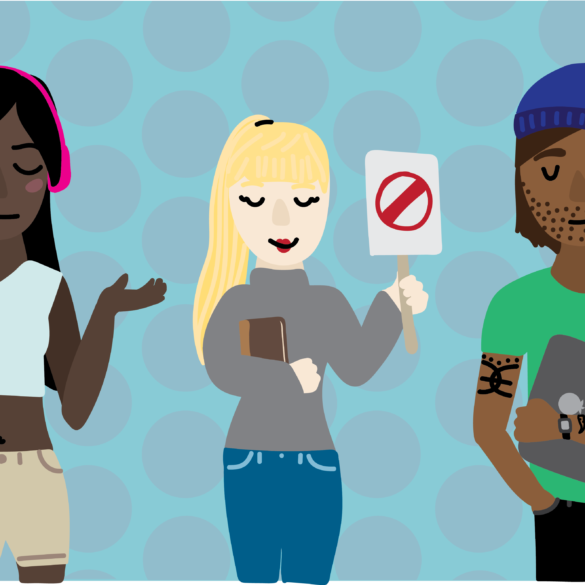Ball Bearings met with three individuals to discuss why young people are repeatedly criticized based on their popular culture
Although Millennials may occasionally feel targeted by stereotypes and ridicule from older individuals, this issue is not specific to the current generation. It is rather a conflict that has existed between age groups of multiple eras.
Pop culture evolves as each group seeks to distinguish itself from the previous generation. This change may present a threat to the identities of previous groups, who answer with criticism. How can different generations respond to one another’s culture in a positive way that cultivates growth rather than feeding a generational divide?
Ball Bearings spoke with the associate dean of fine arts, Michael O’Hara, sociology department chairperson Melinda Messineo, and fashion merchandising major and Millennial Samantha Hunt to discuss the causes and impacts of this phenomenon.
Ball Bearings: Why do you think young people are so often ridiculed and stereotyped by the generations that came before?
MO: The generational divide is usually not between all members of each group, but rather with more conservative members of the older generation and with more progressive, change-oriented members of the younger generation. There are always significant numbers of young people who are lauded by members of the older generation, and members of the older generation who laud the progressives. But the phenomenon you’re actually talking about occurs because, generally, people fear change. When youth redefine relationships, terms, ideas, and expectations, that can force an uncomfortable change in older generations. It violates what they want, expect, or believe out of the world, so they resist and try to suppress it.
MM: We are socialized within a specific experience that gets set as the normal state. Early adolescence to young adulthood stabilizes a lot of our values and beliefs, so those become very much connected to what we perceive as our identity. When we have these cultural shifts, we find them threatening to who we are and how we conceptualize ourselves. The reality is that culture is constantly changing, and we are merely coming in at certain points in time that seem bracketed by our own life experiences in ways that are rather arbitrary. There’s a concept in sociology of “cultural lag”, when one part of society is changing at a different rate than another. Older individuals are often responding to that experience.
SH: When older generations become smarter and more experienced, much of what younger generations do starts to seem immature. For instance, I see high school students and think that they act immature, but I know I did the same things at that age.
BB: What generalizations have been made about Millennials and their pop culture?
MO: I think most of the generalizations that have been placed on today’s Millennials are in fact the failings of the Baby Boomers themselves. The Baby Boomers are an entitled generation. Their parents are the ones who went off to World War II, and they grew up reaping the benefits. They were the largest single population to move through the demographic, and they caused the entire world to change to accommodate them. In criticizing Millennials for being lazy or expecting things, Baby Boomers are not looking honestly at their own experiences. They’re not recognizing that a significant number of Millennials are in fact working very hard. This also relates to pop culture. I mean, I’m not a fan of rap, and “Hamilton” is the most important musical on Broadway right now. But rock and roll was demonized when it first came out, which is of course the Baby Boomers’ revolutionary music that was poo-pooed by the then older generation.
MM: I think there is this overemphasis on the technology reliance and self-centeredness of Millennials. People think about the selfie and similar trends as being particularly narcissistic in some ways. But I suspect that other generations would have acted similarly given the same technology. That behavior is being documented and preserved today in a way that it had never been, but I think it’s much more about how young adults develop their own identity and understanding of who they are. So what will be the test of time is to see how Millennials mature. Do they mature out of these behaviors and experiences or does that get carried along?
SH: People think that we’re lazy, we care more about material things, and we care more about ourselves than others. Stereotypes have also been made about the emphasis we place on pop culture, and that we base our whole lives around what the media tells us rather than forming opinions and identities of our own.
BB: Have there been certain stereotypes repeatedly placed on youth, regardless of generation?
MO: There are common failings of both youth and age. Young people tend to take more risks, in part because they don’t know as much, or they haven’t suffered as much, depending on why they took the risk.
MM: Yes. Some of the stereotypes include irresponsibility, lack of focus, lack of drive, and lack of commitment. To a large extent, it’s because of that period in life when you are developing your sense of self. You are differentiating your own values from those of your parents. You’re clarifying your own values to your peers, and understanding who your peer group is. That is viewed as being rather self-centered and unmotivated by adults, generation after generation. The people who are complaining now had those same complaints leveled against them.
SH: People might assume that when you’re younger you can’t think for yourself, and that adults make decisions for you. People don’t necessarily give you a say in things.
BB: Why do you believe different generations have such different senses of pop culture? In other words, why do trends change over generations?
MO: They are part of identity. There are so many important ideas that get bound up in who we think we are that occur when we think we are making these tremendously important, life-changing decisions about our lives. The music, art, and cultural surroundings in which those decisions take place take on a great deal of importance. As the culture shifts away from those moments in time, it can feel like a betrayal to the person for whom this is the greatest artist ever.
MM: There is this interesting thing where everything old is new again. People like to individuate themselves, but there are only so many ways that you can do that. Sometimes moving forward involves looking back. But how deep that desire to be unique goes into the population may vary over time. There are some general trends where conformity vs. individualism ebb and flow. American culture generally supports uniqueness and creativity more than some other cultures. So there are things I see now that are pretty new and trendy that were new and trendy quite a while ago. For example, the current trend towards beards. In the late 1800s that was the height of male attractiveness.
SH: I think it has a lot to do with the economy and current events. With the recession, people had to save money, so thrift shopping was a huge thing. It was almost what you had to do, so it became cool.
BB: How has trend development changed from generation to generation? Who determines, and how do people know what’s “cool”?
MO: There is a book called The Tipping Point that offers a very good model for how pop culture tends to happen. Younger generations are actively looking for ways to differentiate themselves from the previous one. There are people that this book calls “mavens” who discover and promote these new sounds, songs, and artists. Eventually the early adopters join in, and when there’s enough of them, the mass of “middle” come in. Then there are the “laggards” who are never going to like it; they are going to like the old music or music yet to come. It’s a regular cycle that happens all the time.
MM: Trends can come from different places. Sometimes they are cultural, reflecting beliefs and norms of a social movement. For example, the music and art of the 60s reflected the civil rights movement and the war at that time. But you also want to acknowledge the marketability of certain elements of popular culture. An innovative idea from the creative class gets co-opted because it has commercial value, and then it is reinforced through market processes. There is this commercialization of the popular. If anything becomes too popular, then it’s not cool anymore, and you have to push that envelope again. That may come from young adults, the creative class, or marketing innovation. You can also have international, cross-cultural pollinations. But technology has completely changed the pace of it. Something that would have maybe been popular culture for a six month period may now only be for a six week period.
SH: I think it has a lot to do with celebrities. I think it starts with the designer or manufacturer and slowly trickles down to the everyday consumer who sees that on a celebrity or reads an article about it.
BB: Where do you think stereotypes, such as “basic” and “nerdy” come from and how do they affect those associated with them?
MO: Well, I have been called a nerd, but I’ve never been called basic. Back in my day, I think somebody would be a “rich bitch” or a “princess”. I think that’s what “basic” means now. Nerd still means the same thing, though. It depends a lot on how the person who is being named that way wears it, or whether they take pride in it. And it wasn’t until I was well out of my own nerdom that nerds became cool, thanks to a couple of very big movies. So those things have changed. Being called a nerd today isn’t nearly what is was to be called a nerd in 1975.
MM: All of those stereotypes are just relative. For instance, there was a time when having the tiniest, most unnoticeable ear buds was the thing. That you could get cool audio sound in this tiny earbud was amazing. And now you’ve got the Beats headphones that have all kinds of bling on them. Geeks and nerds and all that, you know, that just changes. But what does it do to the individuals themselves? It’s interesting to think that at one moment you were not cool, but then culture changed around you and your style was awesome. The beard example applies again, with men who had beards all through this process and now they’re cool again. I wonder what it would be like for them. In some ways it might even be irritating, because they were distinguishing themselves from the mainstream, and now the mainstream is modeling them.
SH: I feel like they start off just as descriptive terms that the younger generation twists to make uncool. It may even start with someone who’s not considered “basic”, creating the term to be negative or unpopular. Deep down, the people associated with those stereotypes probably don’t like it, but they tend to accept it. Girls are usually fine with being a “basic white girl”. You know, if they get a pumpkin spice latte, that means they’re basic. But I feel like deep down they wouldn’t necessarily want to be called that.
BB: What are the effects of younger generations being ridiculed for their interests and likes?
MO: There are some for whom this becomes a point of anger, so they become more rebellious or energized by it. And there are others for whom it just slides off their back. I think the effects vary with the individual and the context, why they are being labeled like that, and what their response is to it.
MM: I think it creates an unnecessary divide between generational groups, where the perceptions of not being understood are accentuated. Both groups are excluding one another from potentially valuable conversations or learning in both directions. It’s also unfortunate that we do a poor job of socializing young people in how to experience the life course. Individuals age without role models of how to be a relevant, engaged, embracing person of that generation. The idea that you lose relevance after a certain age makes people uncomfortable about the aging process itself. What kind of life and future is that? So there are a lot of people focused on trying to stay young all the time, which leaves no role models and eliminates the richness of cross-generational conversations.
SH: I think there is a lot of proving the older generation wrong. I’m in Dance Marathon on Ball State’s campus, and I read an article by our recent president talking about how people think Millennials are selfish and lazy. But then you think about the movement of Dance Marathon, the millions of dollars we raise, and the awareness we spread. Right now, it’s comprised of all Millennials.
BB: How can young generations respond to ridicule in a positive or beneficial way?
MO: I think a lot of it has to do with whether or not the individual has embraced a community of people who are similarly labeled. In other words, if you’re a proud nerd and you have a bunch of nerd friends, and somebody calls you a nerd, you’re like, “Okay, yeah, I get it,” and you go about your life. There was open racism when I was in high school. If you so much as dated somebody outside your race, you got called all kinds of names. Today, that’s largely dropped away. As a matter of fact, interracial couples are often celebrated by their peers because it’s kind of radical, cool, and progressive. I think belonging to a community helps you navigate moments when you are ridiculed or bullied, because you have a resource to fall back on.
MM: Young people could hear the criticism as a reflection of the pressure placed on older individuals. Our culture immensely values youth and disdains aging. We’re socialized into those places, and that is a weakness in our society. Our school systems and work environments are often set up to be isolated by age, so you have to be intentional about bridging generations.
SH: It would help to just spread awareness of the reasons why we’re not lining up with those stereotypes. Writing a blog post or getting your word out there, providing examples. Not just backlashing and denying those things, but showing your worth and making it known to the public that those are false accusations.
BB: What are some trends you wish would come back? Go away?
MO: I’m glad that it’s mostly cool to be nerdy. I’m very glad that we’re not back in the 60s and 70s when nerds got stuffed into lockers and beaten up. I am disappointed that we still have “the jock”, the hero of daring do, and that they are allowed to be intellectually inert and not very interesting in class. You know, the band nerd isn’t being celebrated the way the quarterback is. That kind of stratification I wish would go away.
MM: The thing that comes to mind is people making weird faces in selfies. I think selfies are very interesting in their potential for self-exploration and presentation of self. So making the funny face – the fish face is the one that came to mind immediately – I think is an interesting trend, and I wonder why people do it. They want to be seen, but they put on this mask, this guise. It would be cool if people could just smile and be themselves. And the thing to come back… Mix tapes. Those were really cool.
SH: I was never a fan of the Ugg boots, and I read an article this summer that they’re coming back. But they’ve been so popular, so it’s not like I could have any say in it. I really like the fact that 90s clothing is returning, and people are creating their own style. They’re merging what’s trendy today with what was trendy back in the 90s, taking bits and pieces from everything and making an identity for themselves.





